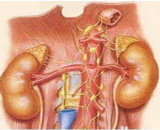High Serum Creatinine (HSC)

Serum creatinine is an important indicator of renal health because it is an easily measured byproduct of muscle metabolism that is excreted unchanged by the kidneys. Creatinine itself is produced via a biological system involving creatine, phosphocreatine, and adenosine triphosphate. Creatine is synthesized primarily in the liver from the methylation of glycocyamine by S-adenosyl methionine. It is then transported through blood to the other organs, muscle, and brain, where, through phosphorylation, it becomes the high-energy compound phosphocreatine. Creatine conversion to phosphocreatine is catalyzed by creatine kinase; spontaneous formation of creatinine occurs during the reaction.
Organism species: Mus musculus (Mouse)
- Disease model DSI632Mu01 Mouse Model for High Serum Creatinine (HSC) In Stock
- Disease model DSI632Mu02 Mouse Model for High Serum Creatinine (HSC) In Stock
- Customized Service n/a Tissue of High Serum Creatinine (HSC) (If Necessary) Tissue Customized Service Offer
- Customized Service n/a Serums of High Serum Creatinine (HSC) (If Necessary) Serums Customized Service Offer
Organism species: Rattus norvegicus (Rat)
- Disease model DSI632Ra01 Rat Model for High Serum Creatinine (HSC) In Stock
- Disease model DSI632Ra02 Rat Model for High Serum Creatinine (HSC) In Stock
- Customized Service n/a Tissue of High Serum Creatinine (HSC) (If Necessary) Tissue Customized Service Offer
- Customized Service n/a Serums of High Serum Creatinine (HSC) (If Necessary) Serums Customized Service Offer
Organism species: Cavia (Guinea pig )
- Disease model DSI632Gu01 Cavia Model for High Serum Creatinine (HSC) In Stock
- Disease model DSI632Gu02 Cavia Model for High Serum Creatinine (HSC) In Stock
- Customized Service n/a Tissue of High Serum Creatinine (HSC) (If Necessary) Tissue Customized Service Offer
- Customized Service n/a Serums of High Serum Creatinine (HSC) (If Necessary) Serums Customized Service Offer
Organism species: Oryctolagus cuniculus (Rabbit)
- Disease model DSI632Rb01 Rabbit Model for High Serum Creatinine (HSC) In Stock
- Disease model DSI632Rb02 Rabbit Model for High Serum Creatinine (HSC) In Stock
- Customized Service n/a Tissue of High Serum Creatinine (HSC) (If Necessary) Tissue Customized Service Offer
- Customized Service n/a Serums of High Serum Creatinine (HSC) (If Necessary) Serums Customized Service Offer
Organism species: Canis familiaris; Canine (Dog)
- Disease model DSI632Ca01 Canine Model for High Serum Creatinine (HSC) In Stock
- Disease model DSI632Ca02 Canine Model for High Serum Creatinine (HSC) In Stock
- Customized Service n/a Tissue of High Serum Creatinine (HSC) (If Necessary) Tissue Customized Service Offer
- Customized Service n/a Serums of High Serum Creatinine (HSC) (If Necessary) Serums Customized Service Offer


